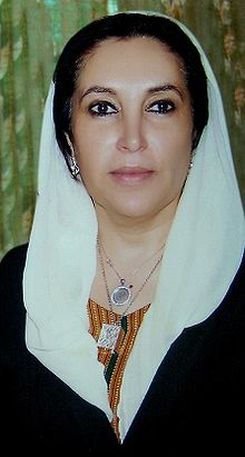 By Yoon Joung Lee A Pakistani democratic socialist and the 11th Prime Minister of Pakistan, Benazir Bhutto, was born in the Karachi Dominion of Pakistan in 1953. Her father, Zulfikar Ali Bhutto, was a former prime minister from 1973 to 1977. She was the oldest child out of four in her family. Including her father and Bhutto, two of her brothers were in politics. However, all of them died violently in the end while demonstrating how dangerous the game of Pakistani politics is. Ever since Bhutto was young, her family expected so much from her as their eldest child. Her parents were very supportive for her education, regardless of her gender. She was raised to speak both English and Urdu, and English was her first language. When she was sixteen in 1969, she left Pakistan to study her for her undergraduate degree at Harvard University’s Radcliffe College. After her undergraduate degree, she joined Oxford University in 1973 and completed her Master’s level degree. There, she studied a wide variety of courses- international law, diplomacy, economics, philosophy and politics. After four years of her study in England in 1977, Bhutto had to return back to Pakistan because the military government of General Zia Ul Haq imprisoned her father and seized power. Eventually her father was sentenced to death by hanging. They were not even able to bury her father’s dead body because Bhutto, her mother and brothers also spent the next six and a half years in jail. During their jail time, Bhutto had developed an inner ear problem that required surgery, and her mother was diagnosed with lung cancer. International pressure led Zia to allow them to leave Pakistan to receive medical care. In 1984, Bhutto and her mother settled in London after their release. As soon as their health issues were remedied, Bhutto began to publicly advocate against the Zia regime. In 1986, she returned to Pakistan to call for the resignation of Zia Ul Haq, who executed her father. While she was in Pakistan, she was elected co-chairwoman of the Pakistan People’s Party (PPP) along with her mother. In 1988, General Muhammad Zia Ul Haq unexpectedly died by the airplane crash. The airplane carried several of his top military commanders and US Ambassador to Pakistan, Arnold Lewis Raphel. There was never a definitive cause for the crash found. In that same year, Bhutto lead the PPP to victory in the parliamentary elections, and became the eleventh Prime Minister at her age of thirty five. She was one of the youngest chief executives in the world, and the first female to serve as prime minister to lead a Muslim nation in the modern age. During her first term, she focused on economic uplift of the masses by starting the Peoples’ Program. However, her first term only lasted for two years as the President Ghulam Ishaq Khan dismissed her from office due to various issues, including differences between her Government and the Establishment. In 1993, she was re-elected as Prime Minister by the largest share in Pakistani history with 86 seats and formed a new Government. This time, she put hunger, housing and health care as her top priorities. She also built schools all over the country and brought electricity to the countryside. However, again her own-nominated President, Farooq Ahmad Khan Leghari, dismissed her government in 1996 on corruption charges. She was forced to leave her homeland. Her family lived in exile in London for nine years. When she was able to come back to their native country, her motorcade was attacked by a suicide bomber. Although 100 bystanders died in the attack, she survived this first assassination attempt. In 2008 with national elections scheduled, Bhutto was again attacked by a gunman who fired at her car before detonating a bomb. She was rushed to the hospital but died at Rawalpindi General Hospital during the long surgery. 10/15/2012 12:07:41 am
A strong,highly educated woman,whom took great risk for her beliefs.Her and her family paid a high price for standing up for the peoples right's.She new she would die for the cause. Comments are closed.
|
Archives
July 2017
Categories
All
|
 RSS Feed
RSS Feed